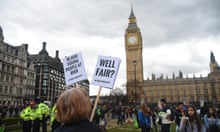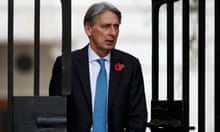Ever since Theresa May set out her vision to govern for everyone and not just the privileged few last July, those in the charity sector who work to reduce poverty and inequality have waited patiently. Campbell Robb, the chief executive of the Joseph Rowntree Foundation, was one of many charity leaders who hoped for progress. He wanted to see a revamp of the government’s much-criticised “troubled families” programme, a £1bn scheme set up by David Cameron in 2011 and billed as the Tories’ flagship social policy initiative.
But when the Department for Communities and Local Government issued its first annual report on the programme , the charity sector was hugely disappointed. Robb described the document that emerged as “thin” and a “testament to the vacuum” that exists where we need to see “big political and social change”. It was barely noted in the media, which focused instead on a range of austerity-driven changes to the tax and benefit system, announced originally by George Osborne, which came into effect at the beginning of the new tax year. The changes hit the poorest hardest, while helping millions of the better off. The view increasingly held by thinktanks, and across the public sector, is that May’s government – even if well intentioned in wanting to reduce inequality and enhance opportunity for all – is too distracted and too constrained by the state of the public finances to do so.
“There is a danger that Brexit could suck the oxygen out of attempts to implement a sweeping programme of social and economic reform that is badly needed at home,” Robb said.
Even within parts of the Tory party, MPs and others worry that Brexit is now the only show in Whitehall, one so all-consuming, so draining of civil service and ministerial energies that everything else – the May agenda included – is on the back burner.
“David Cameron came into office with a new social vision of Conservatism and promptly sacrificed it on the altar of austerity,” says Phillip Blond, director of the ResPublica thinktank. “It is vital Theresa May does not let her one-nation Conservatism experience a similar sacrifice at the behest of Brexit. The trouble with Brexit is that those who voted against the EU as a proxy for globalisation and its general destruction of working-class security, risk finding May’s ‘global Britain’ to be far, far worse for them.”
Ryan Shorthouse, director of the liberal conservative thinktank Bright Blue, says he always suspected Brexit would syphon the energy out of Whitehall and voted against it partly for that reason: “A persuasive argument for voting Remain, I thought, was the lengthy and disproportionate focus that would be required of politicians and policy-makers to undertake the process of Brexit, which is indeed what we are now experiencing. There are other important and pressing issues that urgently require deeper thinking and discussion: the affordability and quality of social care, the upskilling of those on the lowest incomes, the financial sustainability of the NHS, and decarbonising our economy.” The green agenda, once central to May’s predecessor, hardly registers these days.
When the financial crisis broke in 2008, Nick Pearce, now professor of public policy at the University of Bath, was in charge of the No 10 policy unit under Gordon Brown. “It was the biggest economic shock the UK had faced since the second world war,” he says. But it did not preoccupy every government department as Brexit does. “It was largely dealt with by the prime minister, his advisers, the chancellor and Treasury officials, and the Bank of England. It was not like Brexit. Most of Whitehall now has Brexit at the top of the in-tray.”
It has already been decided that the next Queen’s Speech will be dominated by Brexit-related bills. Ministers have been told to limit their bids for domestic legislation so the way is clear for parliament to focus on the “great repeal bill”, which will incorporate the mass of EU law into UK law, and on other Brexit-related bills including one on immigration. A recent report by the National Audit Office says the civil service has already created more than 1,000 extra roles in the two new Brexit departments – for International Trade and for Exiting the EU.
And that is just the start, as the search for trade experts – outsourced over the last four decades to Brussels – intensifies. Many civil servants have shifted from domestic roles to Brexit posts in a huge, destabilising, but necessary, reconfiguration of Whitehall. Jeremy Heywood, the cabinet secretary, has described the task of managing his Brexit troops in Whitehall as “the biggest, most complex challenge facing the civil service in our peacetime history”. The NAO says new skills have to be learnt and found - a process which inevitably means less use of expertise gathered over decades by senior mandarins.
Its report says: “Departments which have had large amounts of EU-derived funding and legislation, for example, will need legal, economic and sector experts to deal with the implications of leaving the European Union, and will have to do so using their remaining staff while also seeking to achieve pre-existing priorities.” Lord Kerslake, a former head of the civil service, says it is entirely right that the focus is on delivering a successful Brexit, but he fears problems will develop down the line in unrelated but vitally important areas as eyes are taken off the ball. “Nobody has quite got the measure of this because of the dominance of Brexit,” Kerslake says.
“Of course there is a need to equip government for Brexit but there is also a need to carry on with the rest of the business of government. There is a risk for the government in this: that things that would have surfaced through being debated and being challenged in normal times will now not surface early, and not until they become crises.”

Emma Norris, programme director at the Institute for Government, says the repercussions are already being felt on issues of critical importance. “After trailing a big decision on airports, a parliamentary vote on Heathrow was pushed to late 2017. Key social reform policies in education have been delayed too, like the national funding formula, which was originally due to be implemented this year, but will be delivered at least 12 months late.
“The fate of English devolution – formerly a major priority – is also in question. Adult social care and hospitals are being pushed to breaking point and, in the case of prisons, beyond it. Ambitions to reduce demand, make better use of technology and find new ways of working have yet to be realised. Without action, within the next two years the government could face a disastrous combination of failing public services and breached spending controls against the backdrop of Brexit.”
She adds: “Even the prime minister’s personal priorities are moving slowly. David Cameron’s life chances strategy was scrapped in favour of a new focus on social mobility. But many of the details of this are yet to come and, as the Social Mobility Commission recently reported, inequality is rising.”
The Resolution Foundation maintains that the need to address stagnating living standards and rising inequality is “the non-Brexit challenge of this parliament”. It points out that typical incomes are set to grow by 3% over this parliament – barely any faster than during the Blair/Brown Labour governments, which coincided with the financial crisis and its aftermath. The thinktank says May’s priority, the “just managing families”, are doing worst of all, with the poorest third of households faring even worse than they did after the 2008 crash. This, it predicts, means we are heading for the “biggest rise in inequality since Margaret Thatcher was in Downing Street”.
Pearce points out that Brexit will also skew spending priorities, creating new pressures on finite resources for a government struggling to keep public finances on a tight rein. “Economic priorities – such as R&D, skills and infrastructure spending – will get higher priority in public spending. Brexit will also create powerful new lobbies, such as farmers, universities and key business sectors, who will be arguing for funding to replace lost European Union resources. These lobbies will find themselves competing with the public services that have lost most from austerity, such as social care. And they will also be up against a neo-Thatcherite wing of the Conservative party that wants to use Brexit to cut corporate taxes and public spending even further.”
Torsten Bell, the Resolution Foundation director, says May cannot afford to overlook problems at home as she conducts her Brexit battles with the EU. “The living standards outlook is bleak and risks giving us the inequality rises of the 1980s, without the feelgood factor of rising incomes. But it can and should change. After all, Theresa May knows her record will be judged as much on the Britain she builds as the Brexit she delivers.”








